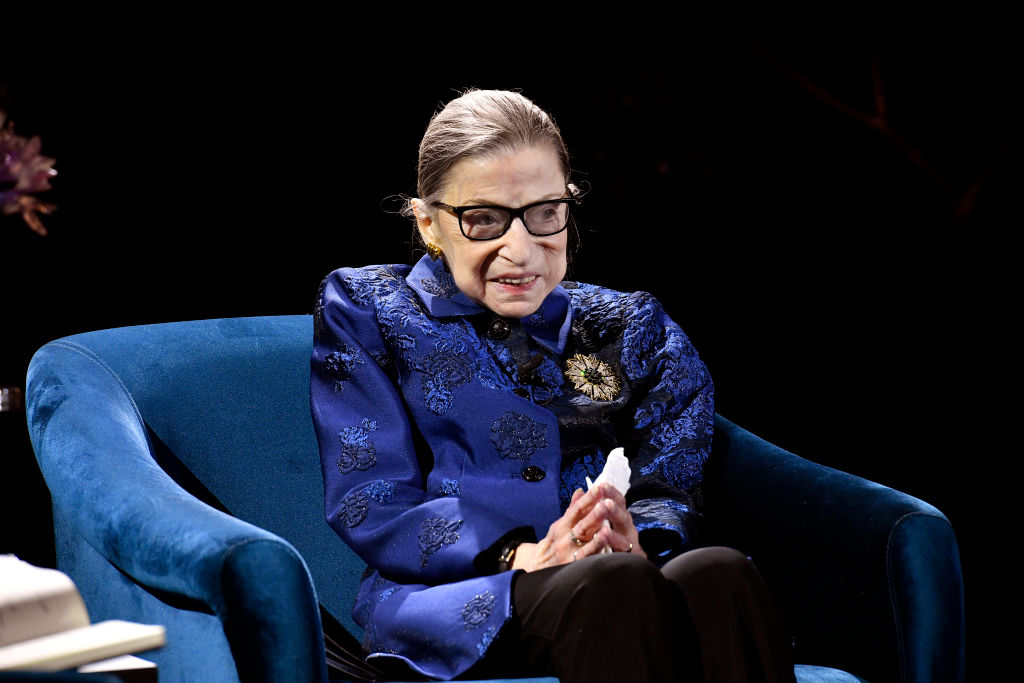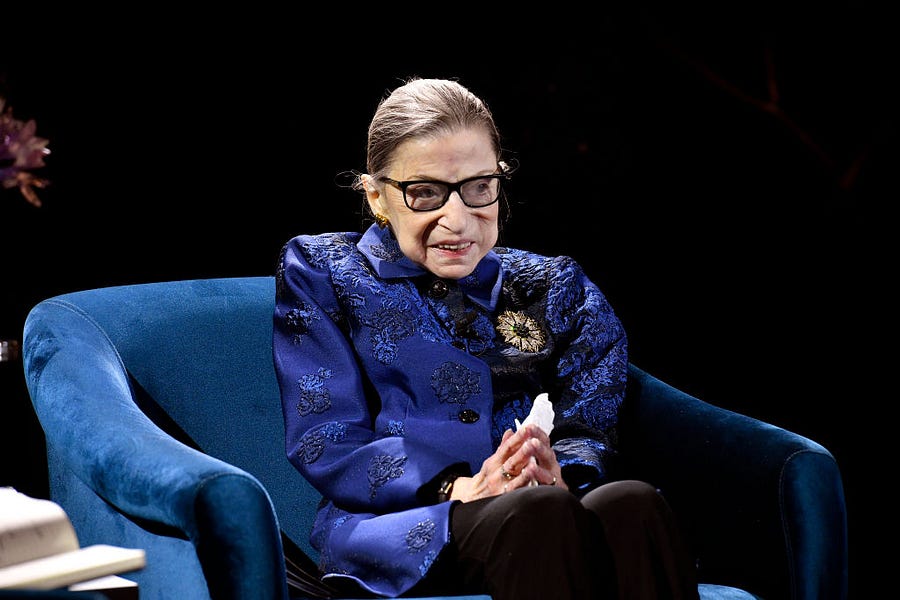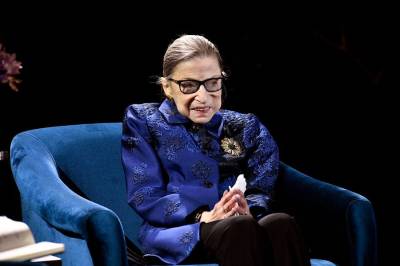Happy Monday! If you were thinking last week that our country wasn’t polarized enough, do we have news for you!
Quick Hits: Today’s Top Stories
The United States confirmed 34,264 new cases of COVID-19 yesterday per the Johns Hopkins University COVID-19 Dashboard, with 3.8 percent of the 897,096 tests reported coming back positive. An additional 216 deaths were attributed to the virus on Sunday, bringing the pandemic’s American death toll to 199,474.


Supreme Court justice Ruth Bader Ginsburg died Friday at age 87 after a years-long battle with cancer. Her death sets up a contentious fight in the coming weeks over when she should be replaced on the court, and by whom.
The White House announced Friday the Federal Emergency Management Agency (FEMA) will be awarding $13 billion in grants to Puerto Rico to help rebuild the island’s electrical grid and infrastructure following Hurricane Maria in 2017. Asked why the aid was being released now—46 days before an election in which Hispanic voters will play a large part—and not back in 2017, President Trump said, “We’ve been working on it for a long time.”
A deal between the White House and the pharmaceutical industry to lower drug prices was scuttled after top White House officials insisted on the issuance of cash cards to be sent to older Americans across the country just weeks before the election. “Mark Meadows, Mr. Trump’s chief of staff, insisted the drug makers pay for $100 cash cards that would be mailed to seniors before November — ‘Trump Cards,’ some in the industry called them.”
President Trump approved “in concept” a deal for TikTok between ByteDance, Oracle, and Walmart, allowing the popular social media app to continue operations in the United States past the Trump administration’s September 20 deadline—which has now been extended a week while the Chinese Communist Party mulls over the arrangement. Trump said he wants $5 billion from the deal to go toward his “patriotic education” efforts to teach people “the real history of our country … not the fake history.”
The two participants in AstraZeneca’s COVID-19 vaccine trials that became sick were diagnosed with an inflammation of the spinal cord known as transverse myelitis, according to the New York Times. The condition is diagnosed in about one in 236,000 Americans per year; two of the 8,000 British volunteers have reportedly developed it.
A package addressed to President Trump and containing the poison ricin was intercepted by law enforcement officials last week. The FBI has reportedly arrested a suspect who was attempting to enter New York from Canada.
The Emmys held a virtual award ceremony last night, with CBC’s Schitt’s Creek and HBO’s Succession, Watchmen, and Last Week Tonight cleaning up in various categories.
Justice Ruth Bader Ginsburg, 1933-2020

Ruth Bader Ginsburg, the second woman to serve on the Supreme Court and lifelong advocate for gender equality under law, died on Friday in her Washington, D.C., home after several battles with cancer. She was 87.
Nominated by President Bill Clinton in 1993, Ginsburg quickly developed a reputation for her fiercely articulated majority opinions and dissents, becoming a reliably progressive presence on the bench. Yet she is remembered by friends for her congenial approach to colleagues of differing judicial philosophies; her camaraderie with conservative lion Antonin Scalia is the stuff of Washington legend.
Ginsburg earned her bachelor’s degree at Cornell University before attending Harvard Law School, where she was one of only nine women in her class of about 500. She later transferred to Columbia Law School and finished first in her class, even as she raised her first child with her husband, Martin Ginsburg. Called “Marty” by friends and family, he advocated for his wife’s legal career until his death from cancer in 2010.
Despite early setbacks in her career resulting from personal encounters with sexism in the legal profession, Ginsburg was hired in 1963 as a professor at Rutgers Law School in New Jersey. She later returned to Columbia University—her alma mater—to teach law, becoming the first female professor to receive tenure. In 1972, Ginsburg co-founded the ACLU’s Women’s Rights Project and went on to argue more than 300 gender and sex-related cases in the American court system. Ginsburg argued six of those cases before the U.S. Supreme Court.
In the 13 years leading up to her appointment to the Supreme Court, Ginsburg served as a judge for the U.S. Court of Appeals District of Columbia Circuit. But even after more than a decade on the country’s most prestigious appellate court, her path to the Supreme Court remained far from guaranteed. After considering a shortlist of almost entirely male candidates to replace Justice Byron White (his first choice was actually Mario Cuomo), President Clinton ultimately put forth Ginsburg, and she was confirmed 96-3.
During her nearly three decades on the bench, Justice Ginsburg became an icon on the left—the “Notorious R.B.G.” moniker was bestowed upon her by a law student—for her crusading progressive jurisprudence on issues including abortion, women’s health, affirmative action, and voting rights. Three years into her appointment, Ginsburg delivered the majority decision for United States v. Virginia, which held that the Virginia Military Institute’s male-only admissions policy violated the 14th Amendment’s equal protection clause.
“‘Inherent differences’ between men and women, we have come to appreciate, remain cause for celebration, but not for denigration of the members of either sex or for artificial constraints on an individual’s opportunity,” she wrote. “Such classifications may not be used, as they once were … to create or perpetuate the legal, social, and economic inferiority of women.”
In 2007, Ginsburg wrote the dissenting opinion to Ledbetter v. Goodyear. The high court dismissed Lilly Ledbetter’s allegation that she had faced discrimination on the basis of gender during her work for Goodyear, but two years later, President Barack Obama signed the Ledbetter Fair Pay Act into law.
Upon news of Ginsburg’s death, Obama wrote that “Justice Ginsburg inspired the generations who followed her, from the tiniest trick-or-treaters to law students burning the midnight oil to the most powerful leaders in the land.”
President Trump was on stage at a political rally when Ginsburg’s passing was announced; reporters informed him of her death afterward. “She led an amazing life,” he said. “She was an amazing woman, whether you agreed or not, she was an amazing woman who led an amazing life. I’m actually saddened to hear that.”
Hypocrisy Abounds
Ginsburg’s legacy was almost immediately overshadowed by the political arguments about her successor. Within an hour of the news breaking on Friday night, Ginsburg’s granddaughter told reporters her grandmother’s “most fervent” dying wish was that she “will not be replaced until a new president is installed.” A short while after that, Senate Majority Leader Mitch McConnell released a statement mourning Ginsburg, but making clear that “President Trump’s nominee will receive a vote on the floor of the United States Senate.” And we were off to the races.
Dispatch readers ages 4 and up might remember McConnell at one point having a different view of presidential Supreme Court nominees receiving a vote on the floor of the United States Senate in an election year. “The American people should have a voice in the selection of their next Supreme Court Justice,” the majority leader wrote on February 13, 2016, the night of Justice Antonin Scalia’s death. “Therefore, this vacancy should not be filled until we have a new President.”
The vacancy was not filled. President Obama nominated Judge Merrick Garland of the U.S. Court of Appeals for the D.C. Circuit; Garland did not receive a hearing in the Republican-controlled Senate, and President Trump replaced Scalia with Neil Gorsuch the following year. The roles are now reversed, save one key constant: The Republican Senate majority.
Republicans are going to twist themselves into pretzels over the next few days explaining why this time is different, and why President Trump’s nominee deserves a hearing when President Obama’s did not. Democrats will become equally pretzel-shaped providing rationales for why they believed President Obama’s nominee deserved a hearing and President Trump’s does not. The reason these hypocrisies may feel unbalanced is—thanks to the Republicans’ enduring Senate majority—the GOP is in position to win both fights: They had the votes to block Garland in 2016, they (theoretically) have the votes to replace Ginsburg now. The Constitution simply gives the president the power to nominate and appoint judges of the Supreme Court “by and with the Advice and Consent of the Senate.”
Depending on where you choose to begin your history, either “side” could plausibly be blamed for the degradation of norms that have led us to this point. Before Garland, Clarence Thomas in 1991 was the last person to be nominated to the Supreme Court when the presidency and Senate were controlled by different parties. McConnell’s breach is fresher in everyone’s memories—and refusing to even hold hearings for Garland was a clean break from tradition—but McConnell claimed at the time he was simply adhering to “The Biden Rule,” referencing then-Senate Judiciary Committee Chairman Joe Biden’s June 25, 1992 floor speech. “It is my view that if a Supreme Court Justice resigns tomorrow, or within the next several weeks, or resigns at the end of the summer, President Bush should consider following the practice of a majority of his predecessors and not—and not—name a nominee until after the November election is completed,” Biden said. “Once the political season is underway, and it is, action on a Supreme Court nomination must be put off until after the election campaign is over.” Just five years earlier, Democrats—and a handful of Republicans—had scuttled President Ronald Reagan’s nomination of Robert Bork to the Supreme Court.
What Happens Now?
President Trump made clear Saturday morning he would nominate Ginsburg’s replacement to the Supreme Court “without delay.” The administration is reportedly considering three women—Judges Amy Coney Barrett, Barbara Lagoa, and Allison Jones Rushing—for the position, and Trump is expected to announce his decision in the next few days, before the first presidential debate on September 29.
Based on McConnell’s commitments, the Senate will then be faced with one of two options: Vote on Trump’s nominee before the election on November 3, or vote on Trump’s nominee during the lame duck session after the election but before the new Congress is sworn in. Republicans currently hold a slim 53-47 majority in the Senate, meaning they can afford to lose three members of their conference before Trump’s nominee would be tanked, given the tie-breaking vote of Vice President Mike Pence. Two—Sens. Susan Collins and Lisa Murkowski—made clear over the weekend they opposed voting on a nominee in advance of the election. Sens. Mitt Romney and Cory Gardner are among the last remaining swing votes, neither had announced his intention as of early Monday morning.
Reading the tea leaves, a lame duck session vote may be the more likely outcome—out of both necessity and political expediency. According to a 2018 Congressional Research Service report, the average number of days between a Supreme Court nomination and the final Senate vote is 69.6; we’re 43 days out from the election. “This should take as long as it needs to take, but no longer. There is plenty of time to get this done,” Sen. Roy Blunt, a close McConnell ally, told CBS News. “But to get it done before Election Day, everything has to work, I think, pretty precisely.”
McConnell is also balancing competing priorities—cementing a conservative majority on the Supreme Court, and maintaining his increasingly vulnerable Senate majority—and accomplishing the former may cost him the latter. Millions of dollars will be spent in South Carolina, for example, reminding voters that in 2018 Sen. Lindsey Graham said this:
The Democratic fundraising site, ActBlue, announced it had raised a whopping $100 million from donors between 8 p.m. Friday night and Sunday morning. While snap polls conducted immediately after major news events are always worth taking with a grain of salt, a survey from Scott Rasmussen found 52 percent of likely voters believe the Senate should wait to confirm Ginsburg’s replacement until after the election, while only 41 percent believe a new justice should be confirmed as soon as possible. As the Washington Post’s Dave Weigel points out, the evangelical and social conservatives that make up the Republican base will love a third SCOTUS nominee, but the Obama-Trump voters that put the president over the top in 2016 tend to be more politically moderate and less engaged in the culture war.
There’s little Senate Democrats can do to stop Republican efforts as long as they remain in the minority—except threaten retaliation whenever they have power. “Let me be clear,” Sen. Minority Leader Chuck Schumer said on Saturday on a call with his Caucus. “If Leader McConnell and Senate Republicans move forward with this, then nothing is off the table for next year.”
“Nothing being off the table,” in this instance, is a thinly veiled reference to eliminating the filibuster and packing the court if Democrats win back the Senate in November, as they are currently slight favorites to do. Rep. Jerry Nadler, House Judiciary Chairman, was less thinly veiled: “If Sen. McConnell and @SenateGOP were to force through a nominee during the lame duck session—before a new Senate and President can take office—then the incoming Senate should immediately move to expand the Supreme Court.”
Joe Biden—the guy who would theoretically be nominating the justices to that expanded Supreme Court—has advocated against the move in the past. “I would not get into court packing. We add three justices. Next time around, we lose control, they add three justices,” he said in a debate last fall. “We begin to lose any credibility the court has at all.”
“If Donald Trump wins the election, then the Senate should move on his selection, and weigh that nominee fairly,” Biden said in a speech yesterday. “But if I win the election, President Trump’s nomination should be withdrawn. As the new President, I should be the one who nominates Justice Ginsburg’s successor.”
Biden appealed to those “Senate Republicans out there who know deep down what is right for the country, not just for their party.”
“We need to de-escalate, not escalate,” he said. “Cool the flames that have been engulfing our country. We can’t keep rewriting history, scrambling norms, and ignoring our cherished system of checks and balances.”
Worth Your Time
Ross Douthat has a mildly accelerationist take on how Republicans should approach the now-vacant seat on the Supreme Court. “A brave stand in favor of bipartisanship by a few Republican senators might set the stage for a return of wise-man politics,” in which mollified Democrats collaborate with Republicans, reforming the Court to make it less central to our politics, he writes. But the realities of the Republican coalition—and the threat of Biden replacing both Ginsburg and a conservative justice—make a vote to confirm both more likely and perhaps even desirable. Fully acknowledging the threat of court-packing, a partisan fight over a politicized court “could push some power back toward the legislative branch,” Douthat writes, “where under our constitutional schema it still formally belongs.”
Danielle Pletka—senior fellow at the American Enterprise Institute, Dispatch contributor, and 2016 NeverTrumper—made waves last week with a Washington Post op-ed arguing she may be “forced to vote for” Trump in 2020 because, despite her distaste for Trump, she “fear[s] the leftward lurch of the Democratic Party even more.” Read the piece, and then be sure to read the interview she did with The New Yorker’s Isaac Chotiner expounding upon and defending her argument. Pletka said last October “the only thing that could get me close to voting for Donald Trump is Elizabeth Warren.” Now that the Democrats nominated Joe Biden instead, she tells Chotiner that Democratic primary voters’ “choice was irrelevant, because [she doesn’t] think that those voters are the people who are steering the direction of the Party.”
Presented Without Comment: Third-In-Line-to-the-Presidency Edition
Also Presented Without Comment
Toeing the Company Line
“When the president of arguably the best university in the country says that his school is shot through with racism—some of it intentional—why shouldn’t we take it seriously?” asks Jonah in his most recent G-File, discussing Princeton’s dust-up with the Department of Education stemming from a massive own goal by its president, Christopher Eisgruber, who said racism was “deeply embedded” in the university. The DOE took him at his word and launched an investigation—as Jonah says, “I love this so much I want to rent a limo I can’t afford, take it to the prom, and maybe get a tattoo celebrating my love.” But more seriously, he writes, the investigation is a welcome correction to a national debate over racism that is rhetorically “turned up to 11.”
Sarah spoke with Echelon Insights founder and Republican pollster Kristen Soltis Anderson for the Late-Week Sweep. They dove into what methodological issues pollsters are focusing on heading into November, how to correct for some of the polling mistakes of 2016, the “shy Trump voter” (or SMAGA), and Kristen’s advice for aspiring pollsters.
David wrote a particularly sobering French Press—entitled ‘Yes, America Could Split Apart’—in preparation for the launch of his new book (Tuesday!). “I have never in my adult life seen such a deep shudder and sense of dread pass through the American political class” than after the death of Ruth Bader Ginsburg, he notes. America’s polarized political climate, it’s partisan geographic sorting, and accompanying one-party rule, could lead to permanent separation: “History teaches us, from 1776 (for good) and 1861 (for evil), that when geographically-concentrated, like-minded Americans believe their culture is under threat, they can and will determine that the existing union shall not last,” he writes. The only hope is a recommitment to pluralism as a spiritual vocation, and a nation “that protects the autonomy of different cultural and political communities, but creates porous cultural walls between those communities.”
“People ask me this all the time, ‘Why the hell did you stay?’” explains Miles Taylor—the former Department of Homeland Security chief of staff in the Trump administration—on the latest episode of The Dispatch Podcast. “And my response is: If you saw what was happening, why the hell wouldn’t you stay if you cared about your country?” On Friday’s episode, Taylor gives Sarah and Steve an inside scoop as to what it’s like working for a president who constantly gives you orders to break the law and who believes he has “magical powers” to do whatever he wants.
Let Us Know
No matter what we put here, we know what’s on your mind. Our only ask: Be kind, and keep it civil.
Reporting by Declan Garvey (@declanpgarvey), Andrew Egger (@EggerDC), Charlotte Lawson (@charlotteUVA), Audrey Fahlberg (@FahlOutBerg), James P. Sutton (@jamespsuttonsf), and Steve Hayes (@stephenfhayes).
Photograph by Gologursky/Getty Images/Berggruen Institute.







Please note that we at The Dispatch hold ourselves, our work, and our commenters to a higher standard than other places on the internet. We welcome comments that foster genuine debate or discussion—including comments critical of us or our work—but responses that include ad hominem attacks on fellow Dispatch members or are intended to stoke fear and anger may be moderated.
With your membership, you only have the ability to comment on The Morning Dispatch articles. Consider upgrading to join the conversation everywhere.